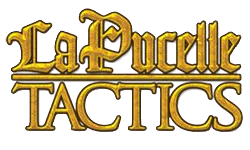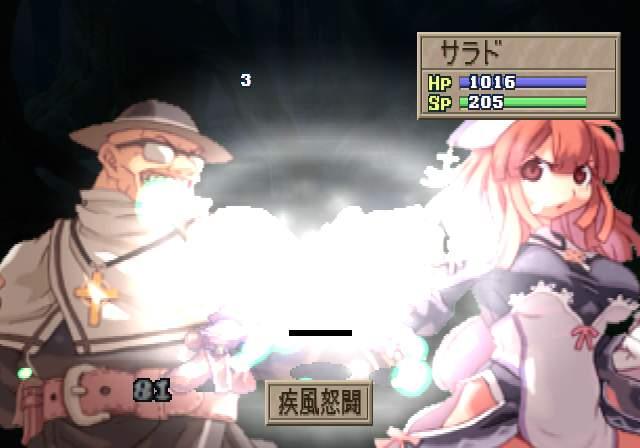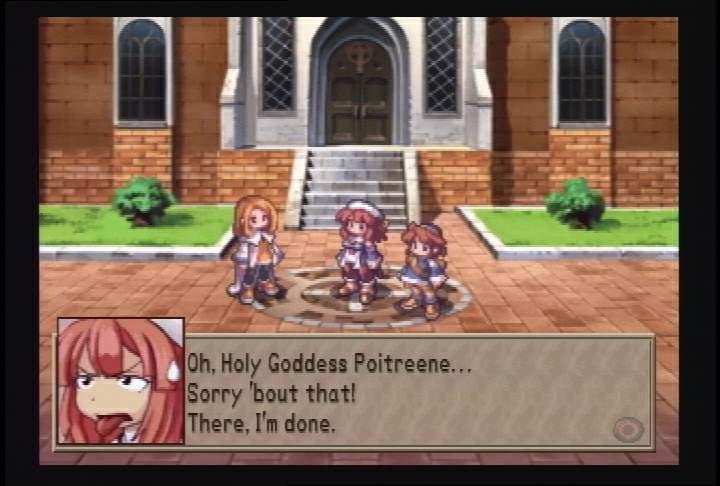|
|

|
BATTLE SYSTEM
|

|
INTERACTION
|

|
ORIGINALITY
|

|
STORY
|

|
MUSIC & SOUND
|

|
VISUALS
|

|
CHALLENGE
|
Medium
|
COMPLETION TIME
|
40-200 Hours
|
|
OVERALL
3.5/5
|
Rating definitions
|
|
|
Prier and Culotte are orphaned siblings belonging to the demon-hunting squad La Pucelle. An investigation of ruins near their town ultimately turns into a long clash with a rival church and its army of demons, leading them to join with many allies and travel across and beyond their homeland, the Kingdom of Paprica. La Pucelle Tactics was Nippon Ichi's first tactical RPG, localized by Mastiff Games in 2004, and features among other things an enjoyable battle system, a nice plot, and decent presentation values, in spite of a few blemishes here and there.
Battles begin at a base panel, from which players can draw up to eight characters to participate in combat. The base panel is usually right next to the exit from the map, with players in most instances able to exit battles any time if they feel they're not up to the task or are getting slaughtered by the enemy. Players can move their characters around the map to perform various commands such as attacking, using special skills, using items, or, in the case of most human characters, purifying Dark Portals from which enemies spawn after a couple of turns, which in turn slightly empowers the equipment they're currently wearing and can occasionally net the player an item. Players and the enemies, by the way, have separate turn sessions.
Characters can also perform combo attacks against enemies with up to eight characters, with all characters, if at least one enemy dies, gaining experience; enemies too can form their own combos against your characters, with characters and enemies alike attacking each other at least once during a round of attack. When enemies die, characters that participated in the attack also increase stat attribute levels depending on their current equipment, which can allow them to learn innate skills granting bonuses such as occasional critical attacks, increased purification power, and so forth. When a character uses a special skill, though, it executes instantly, with skill level increasing depending upon how often skills are used.
 "No one escapes the Paprican Inquisition!"
"No one escapes the Paprican Inquisition!"
|
|
Purification can also be used against enemies in addition to Dark Portals, which will make them more likely to join your party after being defeated. After you win a battle, players, in addition to spending money, gain a number of commands they can use on monsters, with one type increasing their happiness level and the other increasing their stat growth yet decreasing their happiness, both of which must be used carefully, because once a monster's happiness reaches zero, they'll run away. If a monster's happiness reaches ten, it will be able to use the Purify command.
If a monster and its equipment are powerful enough, players can send them to the Dark World to gain a higher-level item, though since leveling them and their items can be fairly taxing at times, this feature at best plays a minimal role in the game. However, depending upon how often players leave Dark Portals open in certain maps, they can enter the Dark World itself, which, while very rewarding, can be very challenging.
There really isn't much to complain about with the battle system, aside from the occasional boss battle you can't retreat from, though winning those simply requires players to defeat the boss, which isn't a terribly difficult task if your levels are sufficient. The need to pay attention to many aspects of a character's stats and the various interface problems are a downfall, as well. Moreover, all characters are apparently skilled in the Living Force, as they magically vanish from the battlefield when they die and can't be revived unless you go to the World Map. Still, the battle system has enough features to prevent players from dozing off.
Few Nippon Ichi games have good interfaces, and La Pucelle, unfortunately, is no exception. That all characters can equip any kind of equipment in their four inventory slots makes for some pretty tedious character management, and the need to pay attention to dozens of character stats and attribute levels doesn't make things any better, and while shopping, it might've been nice if the game let you see old stats alongside new stats, as well as which specific attribute levels old and new equipment increase, when "fitting" equipment. The game is, however, mostly linear, so finding out where to go next is a no-brainer, but the developers could've certainly made La Pucelle more user-friendly.
 On a tongue and a prayer
On a tongue and a prayer
|
|
La Pucelle's atmosphere, story, gameplay mechanisms, and so forth, set it apart from other tactical RPGs, although it does mildly derive minor tactical aspects, such as separate turn sessions, from previous TRPGs, features visuals similar to its predecessors, and has some minor links to Rhapsody: A Musical Adventure and its sequels Little Princess and Angel's Present.
The story is pretty well-executed, with decent character development and backstory as well as a villain with satisfactory motivation, although there are certainly some diversionary events. La Pucelle, moreover, underwent some censorship at the hands of Mastiff Games, for instance, with Croix smoking invisible cigarettes, one character crucified on an invisible cross, and other crosses being removed, as well; come on, even Don Bluth's G-rated movies have smoking and drinking in them, and there really isn't much excuse for censorship in this day and age of games like Grand Theft Auto. The minor references to the Marl Kingdom trilogy will be lost to American gamers, as well, but otherwise, the plot is one of the game's highlights.
Tenpei Sato's soundtrack and the English voicework are largely hit-or-miss, although players can switch to the Japanese voicework (which does, unlike in Disgaea's English version, extend to the battle voices, as well) if they can't stand the sound of English voice acting. Even so, the aurals really aren't a major selling point.
La Pucelle's visual style combines 2-D and 3-D elements, although unlike its successor Disgaea, La Pucelle emphasizes colorful pre-rendered scenery and character sprites far more during cutscenes and in towns, and features superb art, to boot. The battle scenery, though, does appear blocky and rushed at times, although the game does rely on still scenery and decently-animated sprites and effects when characters and enemies execute their commands. Overall, a decent-looking game.
La Pucelle, depending on how exactly the player wishes to play, can be a fairly length game, with playing time ranging anywhere from forty to two-hundred hours. Overall, La Pucelle was a pretty decent dive by Nippon Ichi into the tactical genre, with most elements aside from its interface and aurals being decently polished. Admittedly, if you think Disgaea is the greatest tactical RPG of all time, it'll likely disappoint you, although if you're new to Nippon Ichi's games, La Pucelle would most likely be a better starting point.
Review Archives
|









